Among the most practical and the quickest methods to get a lot of traffic to your website is to get your webpage on the first page of the Google search engine. It makes a lot of sense to do that because a single high traffic keyword in Google can bring thousands of visitors to your website every day.
It also means that if you can get your webpage to show up on the top of Google for only a few high traffic keywords, you’re likely to get a reasonable amount of traffic each month. However, the only problem with this scenario is that it’s often hard to get your page in the top 10 results of Google for a popular keyword because there are lots of people and companies competing against you.
Fortunately, there are still millions of highly lucrative keywords that get a lot of traffic and such keywords also have low competition. For website owners, these are the golden nuggets that they can pick to get a decent amount of traffic on a regular basis. In this article, we will discuss how you can find such keywords that offer a high traffic volume and low competition.
To find these golden nuggets, you can use several reputable websites that will allow you to filter your results based on how difficult it’s for you to rank for the desired keyword.
What is Keyword Difficulty?
A keyword difficulty score measures how hard it is to rank for a specific keyword in a search engine like Google.
Where can you get a keyword difficulty score?
There are a number of good keyword explorer tools. We will discuss these in a while. Before the discussion, the following few paragraphs describe what SEO difficulty means.
If you use a keyword explorer, you will notice that almost all of the major platforms attach a numerical value between 0 to 100 to a keyword. The score represents the degree of difficulty to rank for that keyword in a major search engine like Google. The higher the score, the more difficult it’s to rank for that particular keyword.Here is an example using the keyword “food delivery”:
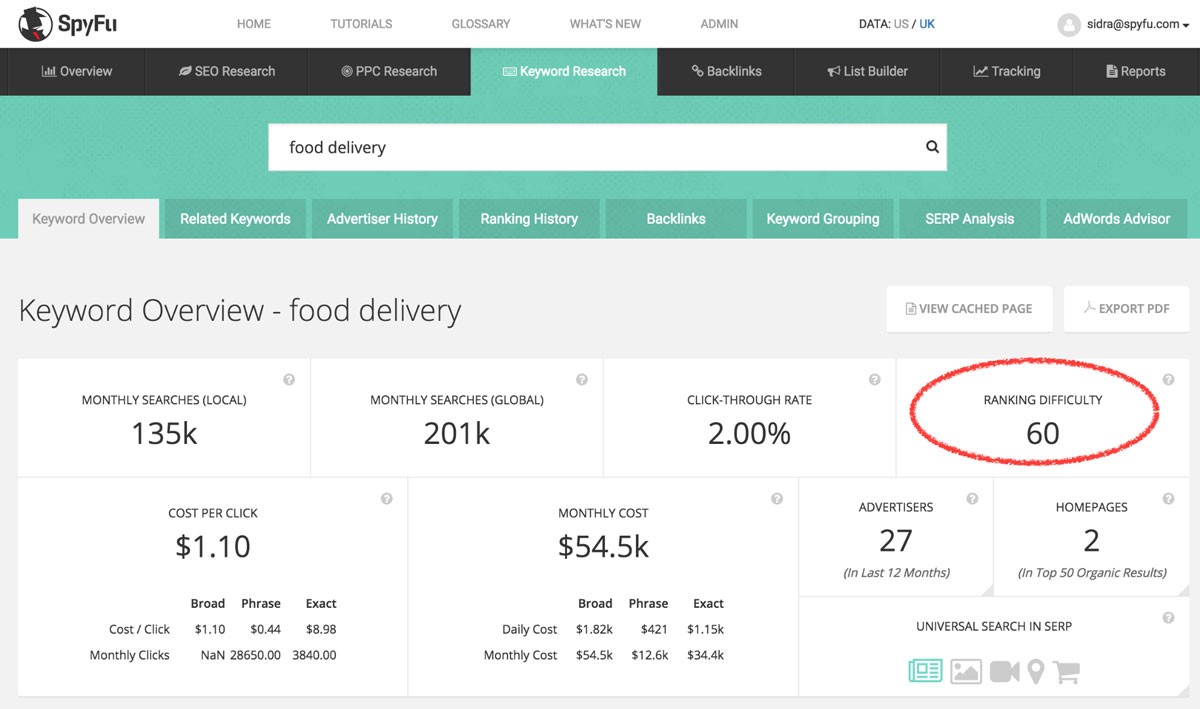
(Image Credit: SpyFu)
For instance, if you are an auto dealer in Bayonne, New Jersey and want to rank for the keyword “buy used cars”, you can use a variety of different keyword tools to get thousands of relevant keywords and the difficulty score associated with each.
In the auto dealer example, a good keyword tool will let you view the SEO difficulty score of the keyword “buy used cars” and hundreds of related queries. Since “buy used cars” is a generic keyword, it may have a very high score above 90 making it almost impossible to rank for. On the other hand, you may find that certain long-tail-keywords such as “buy used cars in Bayonne New Jersey” have a decent amount of search traffic and a low SEO difficulty score making it more practical to target for your keyword campaign.
Improve your content marketing + SEO in 60 seconds!
Diib uses the power of big data to help you quickly and easily increase your traffic and rankings. We’ll even let you know if you already deserve to rank higher for certain keywords.
- Easy-to-use automated SEO tool
- Get new content ideas and review existing content
- Checks for content localization
- SEO optimized content
- Built-in benchmarking and competitor analysis
- Over 500,000k global members
Used by over 500k companies and organizations:
Syncs with 
If you’re using more than one tool to get keyword difficulty, it’s also important to realize that every software has different parameters on how they rank keywords. In other words, it means that a score of 30 on one keyword checker tool may not correlate to a score of 30 on another keyword tool.
To make things a little easier, many keyword tools provide a range to understand their metrics.
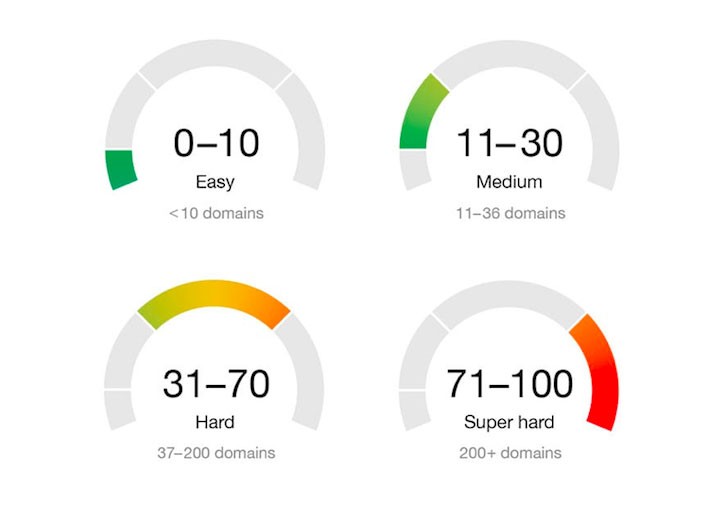
(Image Credit: WordStream)
Ideally, you would want to stick to one or a maximum of two keyword tools. It’s recommended to take a free trial to understand each keyword platform before subscribing to use their data.
You Might Also Like
You will also realize that the score provides a measure of the difficulty to rank in the top 10 spots in a typical search engine. A score of 5 means that it is generally easy to rank for the top ten positions in a search engine for a particular keyword.
Before going any further, here is an overview of how these websites measure web page difficulty and how you can use the insight to get top rankings in SEO.
How is the keyword difficulty measured?
To measure the difficulty of a keyword, most keyword tools are based on the premise that there are only a few basic factors that play an important part in ranking a web page.
After interpreting hundreds of different factors that Google uses to rank a web page, experts seem to have concluded that only certain factors are critical to ranking. To get keyword difficulty, the SEO difficulty score mainly looks at the following factors:
- Content of the page: The content of the page assumes that factors like the title tag, headline, and the keyword density are important to get a higher rank.
It also means that you can improve your chances of ranking higher on the search engine by tweaking only a few factors on the content of the page.
- Links for other websites: We all know that getting links from other websites is critical to getting a high rank in Google and other search engines.
Usually, the difficulty score for a certain keyword is low if the web page on the top 10 results does not have many external links.
- Domain authority: Domain authority tells you how authoritative is a website in the eyes of a search engine. Usually, it takes a lot of time to build domain authority. It also means that it’s easier to improve domain authority score from 20 to 30 than it’s to build an authority score from 50 to 60.
A keyword tool will let you know the DA score of websites in the top 10. As such, a high keyword score often includes multiple websites of high DA dominating the results.
While this is not a complete overview of how the difficulty score is measured, it certainly gives enough information to understand the concept.
Now that you understand what SEO difficulty means, let’s discuss how to check keyword difficulty and how you can tweak the results in your favor.
How to check keyword difficulty?
There are a lot of good websites to check the difficulty score for your desired keywords. Some well-known websites are Ahrefs, Moz, and KwFinder. These three are highly recommended websites but you can try others through a quick Google search. The image below shows Moz’s keyword difficulty tool:
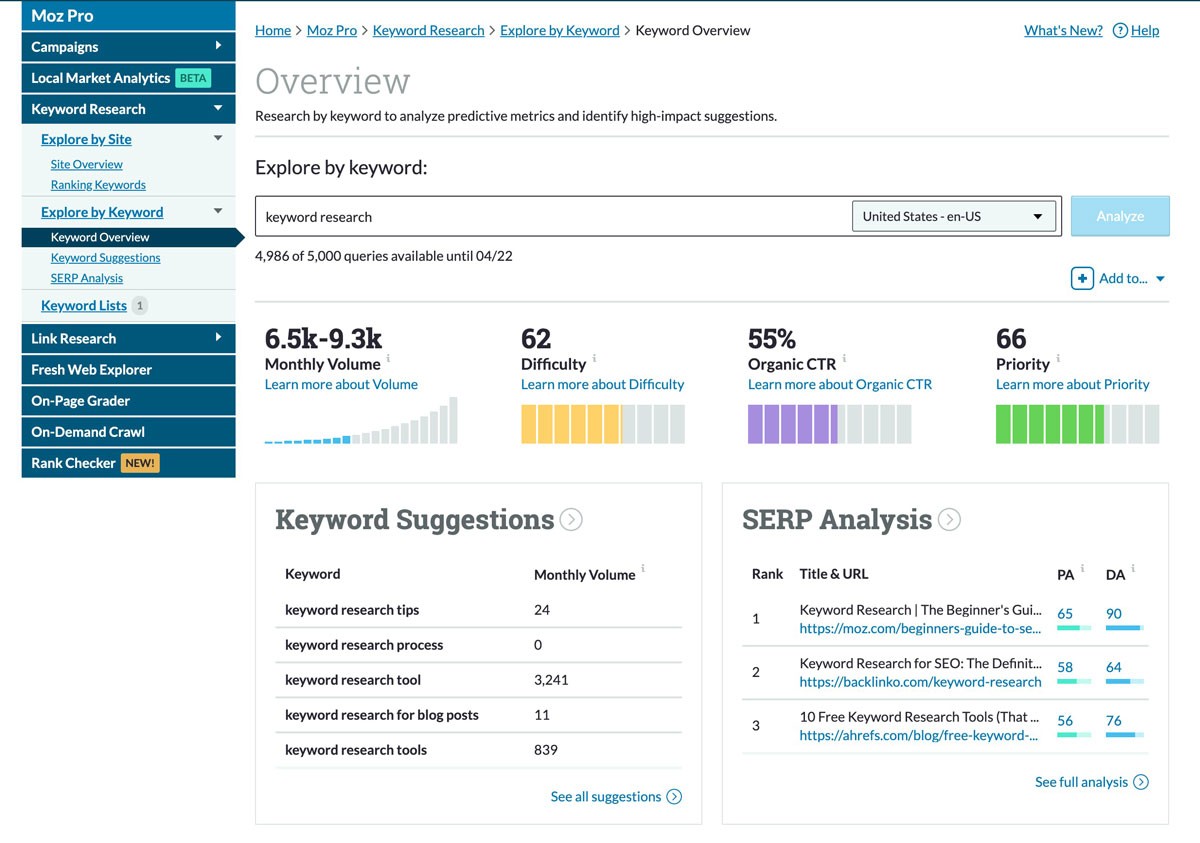
(Image Credit:Moz)
Most of these websites offer a monthly subscription and multiple plans to choose from. You can select the plan based on your desired level of keyword research. If you want to take these for a test-drive, some even offer a free trial.
After the subscription, you will get access to the keyword dashboard where you can input your keyword to find hundreds of keywords related to your niche. Each keyword and hundreds of similar keywords can be sorted out by their respective difficulty scores.
How to use these tools to your advantage?
To use the tool effectively, you want to filter keywords that have a relatively high search volume and low score. As a result, you can tap into hundreds of keywords that are easy to rank for. For example:
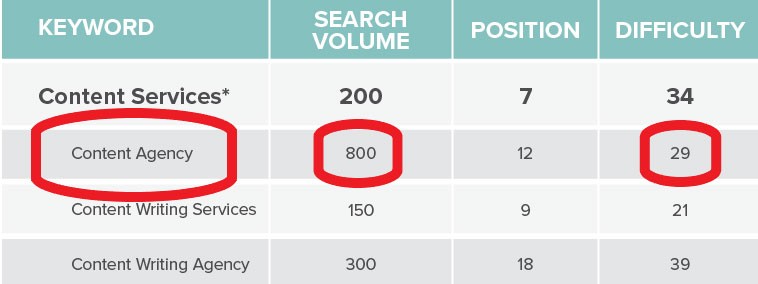
(Image Credit: Brafton)
Never ignore keywords with monthly traffic of about 200 or 300 visitors. Many of these low search volume keywords are super easy to rank for. Ultimately, you can build a list of these low volume and low difficulty keywords to get a reasonable amount of traffic each month.
You should also look out for synonymous and similar words. A lot of time we ignore related keywords that may give us better results. There are also additional opportunities from long-tail keywords that are ripe for the taking.
We hope that you found this article useful.
If you want to know more interesting about your site health, get personal recommendations and alerts, scan your website by Diib. It only takes 60 seconds.
How to tweak your webpage to get the top 10 rankings?
Once you have selected the desired keyword, look at the most important parameters of the top 10 web pages provided by the keyword tool. These parameters will likely include details related to multiple factors that make up the difficulty score. You may see Domain Authority, Page Authority, Number of Backlinks, the Age of the Web Page, the Title Tag, Keywords in the Content, and other important info.
To keep it simple, most tools only offer up to 10 parameters by default because these parameters mostly decide the rankings in the search engine.
After selecting your keyword, look at these parameters to see if something stands out that may make the job easier or difficult. For instance, it’s possible that you may find a reasonable keyword to target but most of the pages in the top 10 are high DA pages. If you’re a new website with a low DA score, getting in the top 10 may prove difficult due to the anomaly.
On the other hand, you may also find great opportunities by looking at the parameters. Instead of a high DA score, you may find that there are three or four new web pages that are no older than a month. It means that your new website can easily outrank those web pages by improving only some of the factors that may take less than a minute or two.
While the keyword score offers an overview of the difficulty, it’s also important to look for such anomalies before deciding to tweak your webpage.
Another useful trick is to look for search intent. Simply, it means that you should take a look at the top five pages to see if you’re not missing something. For example, a recent Ahref’s study concluded that the team at Ahrefs could not make it to the top ten of a particular keyword even after making considerable changes to a high volume keyword. After investigating, they found that all of the other top-ranking pages were giving a free backlink checker. As soon as the page embedded the free backlink checker, it fixed everything propelling the page to the top of the list for the high volume keyword.
How long does it take to reach the top 10?
For certain easy to rank keywords, you can see an instant result whenever the Google spider will visit your website. It means that it can take anywhere from a few hours to a couple of days to see your webpage on the top 10 of a certain keyword.
As a rule of thumb, you will see quicker results for comparable keywords if you have an established website. This is one of the reasons why a new website should mostly target easy keywords so that they don’t have to wait a long time for the results.
It’s also important to remember that you may see a gradual increase in rankings. Sometimes, your page will move one or two pages every day until it reaches the top. While there is no definite answer to the question, it’s not impractical to get quick results using the keyword explorer tools.
Top 5 keyword tools to search for low competition keywords
- Ahrefs Keyword Explorer: This is probably one of the finest tools for SEO in the market. The online portal is backed by solid data as its own bot crawls more web pages than any other crawler except Google. They offer a free trial, which you can use to get a detailed overview of 10 different search engines in 171 countries. The enormous depth of the data also means that they can also show SEO metrics such as click per search, return rate, and % of paid clicks. In short, there is a lot of useful data to grasp and interpret.
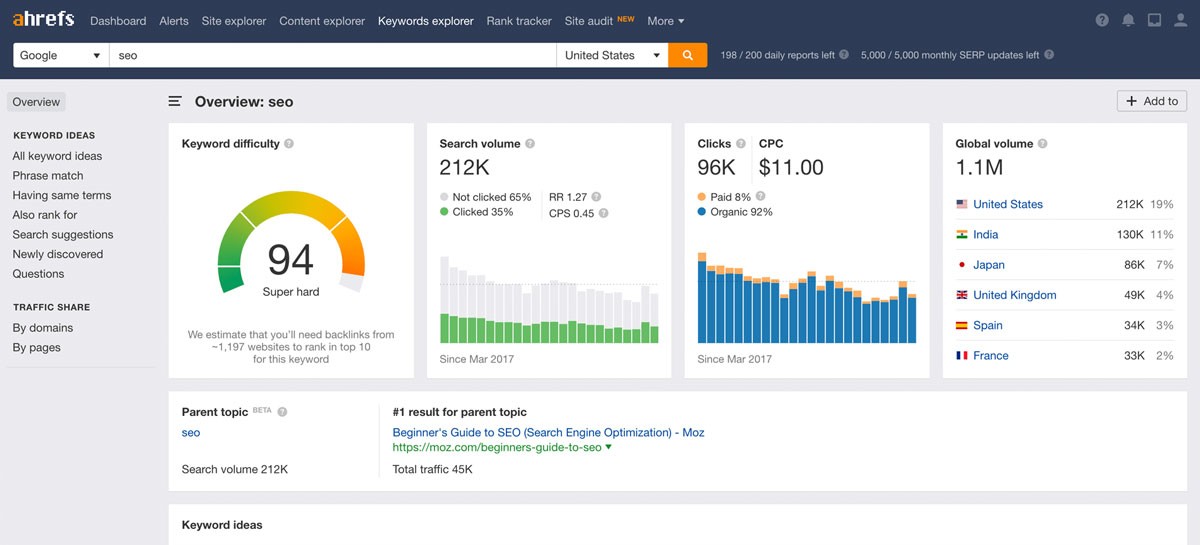
(Image Credit: Ahrefs)
- Moz Keyword Explorer: The closest competitor to Ahrefs is the Moz keyword explorer, which offers millions of new keyword data every day. Just like Ahrefs, Moz also offers tons of different metrics to help you evaluate keywords. To start, put your own URL, which will give Moz a general idea about your website so it can help you get better results. If you are testing Moz and Ahrefs, just remember that there may be a visible difference in how the two tools evaluate the keywords score. Therefore, it’s recommended to use only Moz or Ahrefs unless you can understand all the nitty-gritty that goes into analyzing the difficulty of scoring a keyword. (There is an earlier image that shows an example of this tool.)
- LongTail Pro: The online platform allows you to analyze 13 different keyword metrics. Their website offers valuable education for website owners who want to increase traffic. You can enroll in their free course to get three low competition keywords for your website. If you want to get basic training before subscribing to their system, they have a 7-day trial that also includes hands-on training.
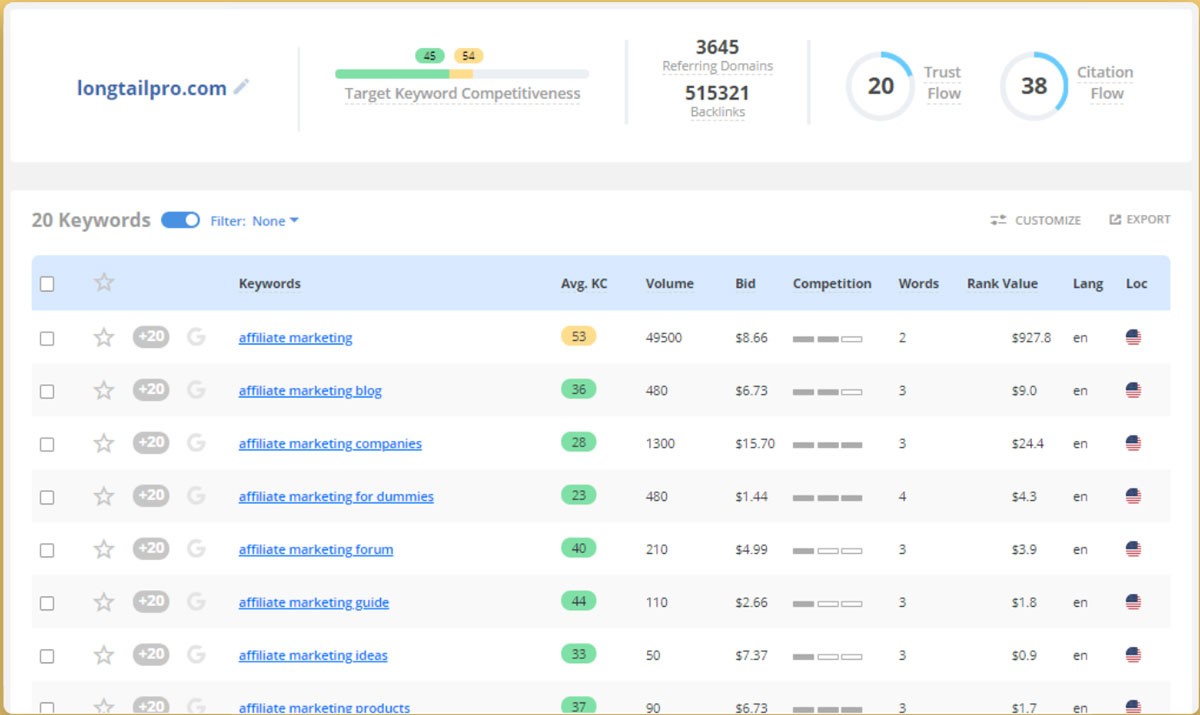
(Image Credit: LongTail Pro)
- KWFinder: If this is the first time you are trying to understand what is keyword difficulty, you will certainly love the user-friendly interface of KWFinder. The colorful interface is easy to read and includes detailed information about different parameters used to determine the difficulty level of a keyword. Besides the interface, their volume data is also accurate, which should help you in your research. You can also conduct a free search on their website.
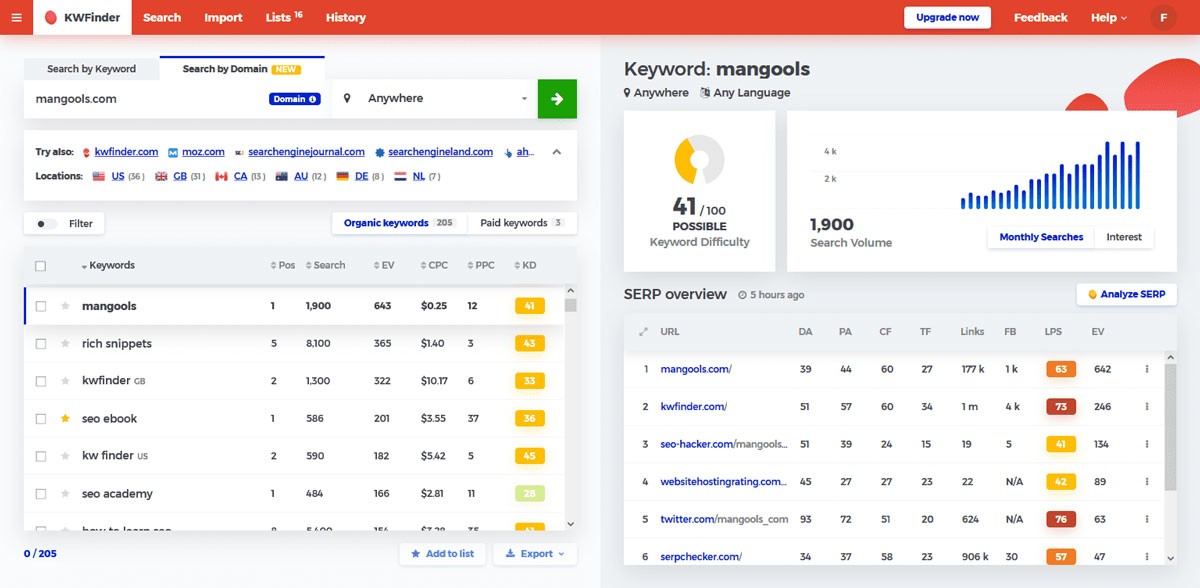
(Image Credit: KWFinder)
Diib®: Monitoring Your Keyword Difficulty!
There are also other useful online platforms for keyword competitiveness data, which you may find useful. These include SEMrush, KeywordTool.io, Sistrix, and SECockpit. Before using more than one tool, just remember that each platform has different methods to evaluate the difficulty score. Diib’s keyword research and difficulty tool gives you the most up-to-date metrics and statistics while offering simple tasks for improvement and repair, where necessary. Here are some of the features we’re sure you’ll love about the Diib software:
- Keyword, backlink, and indexing monitoring and tracking tools
- User experience and mobile speed optimization
- Bounce rate monitoring and repair
- Social media integration and performance
- Broken pages where you have backlinks (404 checker)
- Technical SEO monitoring, including monitoring keyword difficulty
Click here for your free scan or simply call 800-303-3510 to speak to one of our growth experts.
FAQ’s
Keyword difficulty is measured on a scale from 1-100. The lower the value, the easier it is to rank for that specific keyword. However, the real SEO difficulty may vary somewhat.
This is calculated by looking at the authority of domains that are showing up on the SERPs and estimating how hard it would be for a new website/business to beat or outrank their current competitors.
Like many other website owners, you may have been getting your keyword difficulty from a keyword tool. That can be a big mistake. Keyword competition is different from search density. It takes into account more than simply the word, but the reputation of your competitors.
Keywords, good ones, can be defined in several ways. A general, broad term may have a higher search rate, however, a more targeted keyword phrase may give you a higher conversion rate.
Most SEO growth experts preach that an ideal keyword density is right around 1-2%. That means the keyword is used one to two times per 100 words. This will be enough to show search engines what your content is about without being defined as keyword stuffing.



